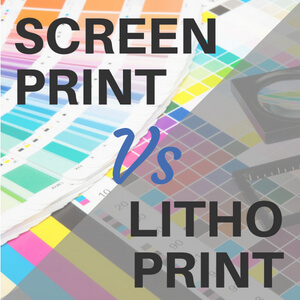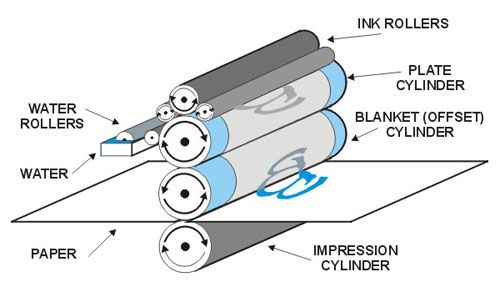The Benefits of Using litho printing for Business Collateral
The Benefits of Using litho printing for Business Collateral
Blog Article
A Comprehensive Overview to Comprehending Litho Printing Techniques
The globe of litho printing, a method originating from the late 18th century, is an interesting mix of background, science, advancement and art. This comprehensive overview will certainly unravel the complexities of this printing method, from the structure of litho inks to the difficulties encountered in contemporary applications. As we venture right into the intricacies of lithography, the relevance of automation and sustainability in ensuring its future importance comes to be increasingly clear. Stay with us as we trip right into the fascinating realm of litho printing.
The Historic Development of Litho Printing
The historical trajectory of litho printing, an essential technology in the world of interaction, is a captivating story of human resourcefulness. Birthed in the late 18th century by Alois Senefelder, this strategy was originally an affordable approach of releasing staged jobs. Lithography, obtained from the Greek words for 'stone' and 'to write', utilized a smooth stone surface to transfer images onto paper. The procedure developed with the introduction of the rotary press, which substantially increased efficiency (litho printing). In the 20th century, the development of countered lithography revolutionized the industry, enabling automation of top quality prints. Each stage of litho printing's evolution showcases humanity's relentless search of performance and top quality in aesthetic communication.
Decoding the Science Behind Litho Printing Inks
Moving on in the expedition of litho printing methods, the focus now moves to the science behind litho printing inks. The structure of these inks, their drying procedure, and shade mixing strategies develop the foundation of this intricate art form. Recognizing these aspects is vital to grasping the craft and attaining the preferred print results.
Composition of Litho Inks
In lithographic printing, the fundamental role of litho inks can not be overemphasized. The make-up of litho inks varies relying on its purpose, yet typically, they contain two primary components - pigments and automobiles. Pigments, the color-providing aspects, are finely ground fragments suspended in the automobile, a fluid that brings the pigment onto the printing surface. The vehicle is a complicated mixture of solvents, resins, and oils, which affect the ink's drying out time, attachment, and gloss. Additionally, different additives exist to improve certain properties like circulation, drying, and resistance to environmental effects. Each part plays a crucial component in the final print's high quality, making the precise formula of litho inks an intricate science.
Ink Drying Refine
From the make-up of litho inks, focus transforms to the remarkable procedure of ink drying. 2 key approaches are utilized in litho printing: oxidative drying and absorption. Absorption, on the various other hand, entails the ink seeping right into the paper fibers, which is a quicker process but can lead to much less dynamic colors.
Color Combining Methods
While the drying process plays a key duty in litho printing, the science of color blending strategies holds equivalent relevance. This is a complicated process that entails the cautious blending of primaries: cyan, magenta, and yellow, in varying percentages to achieve a wide selection of colors. The addition of black ink, called 'essential', helps in regulating the strength and deepness of the colors. The scientific research behind litho printing inks likewise considers the openness of the ink, which affects just how colors overlay and mix. To accomplish an effective shade mix, print experts need to also recognize the complexities of ink habits, shade theory, and the physical residential properties of the substrate on which the ink is applied.
The Art and Layout Aspects in Litho Printing
Litho printing breathes life right into art and layout through its one-of-a-kind components. Litho printing fits a range of colors, enabling artists to develop vivid and vibrant prints. This combination of accuracy and adaptability makes litho printing a favored choice for several musicians and developers.
Modern Applications of Litho Printing Methods
Litho printing methods have located considerable use in the modern business sector. Its impact and value remain to expand with the advent of brand-new developments and technologies in the area. This section will certainly explore these contemporary applications and the transformative duty they play in the printing market.
Commercial Litho Printing Utilizes
In today's electronic age, one may question the importance of traditional printing techniques. Yet, litho printing remains a critical part of the business industry. High-volume printing jobs, such as the manufacturing of books, newspapers, and product packaging, rely upon litho printing for its ability to supply superior picture high quality and price efficiency. The process, which includes moving a tattooed image from a plate onto a rubber blanket and afterwards to the printing surface area, uses unequaled uniformity. This makes it perfect for tasks needing a huge print run. Litho printing likewise supplies a broad color spectrum, premium to that of electronic printing. This makes it the best selection for tasks that demand dynamic, top quality color reproduction.
Technologies in Litho Printing
Pressing the limits of traditional methods, modern advancements have fueled a host of advancements in litho printing. These advancements have not just enhanced the high quality and effectiveness of read this post here litho prints however additionally increased its application extent. One prominent advancement is digital litho printing, which combines the merits of electronic modern technology with litho's premium output. This hybrid model offers faster setup times, minimized waste, and enables on-demand printing. An additional notable development is the introduction of environmentally friendly inks. These inks, made from veggie or soy-based services, have considerably decreased the market's environmental effect. litho printing. Additionally, the development of innovative plate innovation has structured the printing process, leading to sharper pictures and improved shade fidelity. These innovations highlight the go enduring importance of litho printing in the modern-day world.
Exploring the Process of Litho Printing: Action by Action

Obstacles and Solutions in Contemporary Litho Printing

In spite of the precision and practice that litho printing proudly upholds, it is not without its set of contemporary obstacles. One of the most widespread problems consist of the high first setup price, trouble in printing variable information, and ecological problems because of chemical use. Nevertheless, services are arising as modern technology progresses. Digital litho printing enables for cost-efficient short runs and easy personalization, dealing with the concern of variable data. Environmentally-friendly inks and more secure plate-making processes mitigate environmental issues. In addition, advancements in automation have actually minimized labor prices, further democratizing the lithography process. Hence, while there are difficulties, the litho printing sector is proactively adapting to meet them head-on, guaranteeing its relevance in the future.
Final thought
In verdict, litho printing, with its rich background and clinical ins and outs, holds a significant location in the print industry. The future of litho printing pivots on its ability to adjust to these changing demands, attesting its long-lasting value in an advancing market.

Report this page